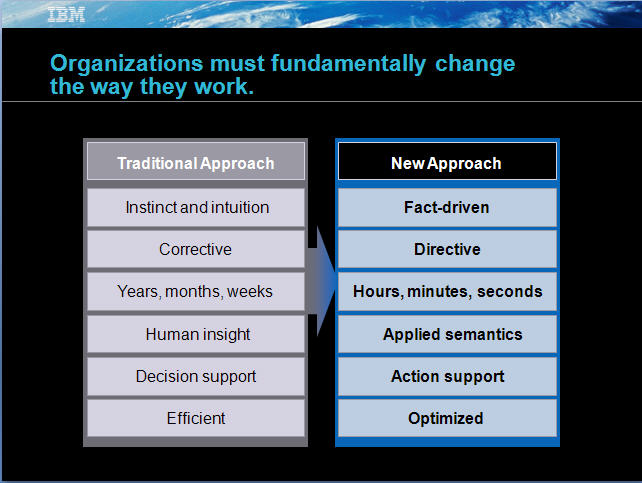IBM launches business analytics services unit; Eyes predictive modeling

IBM on Tuesday unveiled a new services unit focused on business analytics and optimization and stumped for the need to use data to make better predictions.
At an event in its Hawthorne, NY research facility, Big Blue detailed plans to launch its first new services business since 2002. In a nutshell, IBM is taking its knowledge of verticals, mathematics, research and optimization software and lumping it into a service designed to "improve the speed and quality of business decisions."
The move (statement) also wraps a service around recent acquisitions such as Cognos and iLog and links the technology to IBM's PwC Consulting unit. IBM is pitching its latest shift as a "foundational change" that will intertwine analytics in business management. The goal from Big Blue's perspective: See around business corners and minimize risk.
Ambuj Goyal, general manager of IBM's information management software group, said the company has been building out its assets---software, best practices and research---to offer this analytics service.
"How do we use information as a strategic asset? Human capital is a strategic asset. Cash is a strategic asset. Companies don't think of information as a strategic asset," said Goyal.
IBM said it is pushing for "fact based enterprises" that operate more on analytics than intuition. In other words, gut feel will be downgraded in management. Big Blue also noted that it expects rivals to follow.
Here's the quick summary of what IBM sees:
Executives such as Frank Kern, senior vice president of IBM's global business services unit, and John Kelly, director of IBM Research, talked about the rollout.
Kern said that businesses need to become more predictive and deploy "enterprise intelligence." "If we would have had systemic risk predictive capability and looking at risk and how it compounded, how would have the world have looked different today," said Kern, referring to the financial industry. "You can take these questions for financial services, security, health care, water. How can I get new insights on threats based on the data available to me?"
"Decisions are being made on gut feel and intuition. That can't be the case going forward," said Kern.
So far, there are 4,000 consultants dedicated to the new services unit along with 200 math wonks and researchers. Kern said that the services unit "will grow from there."
The scheduled demos highlight a few areas where this service will be used. IBM is set to show off a fraud and abuse management system, inventory management tools and a crime information warehouse.
"It's a rarity that you create a new line in the consulting business. This is not something we take lightly," said Fred Balboni, head of the business analytics and optimizations services unit.
Balboni noted that businesses need to move away from "read and react" to be more predictive.
IBM's latest service is built on:
- Strategy, governance and process improvement;
- Business intelligence;
- Analytics and optimization;
- Enterprise information management;
- And enterprise content management.
